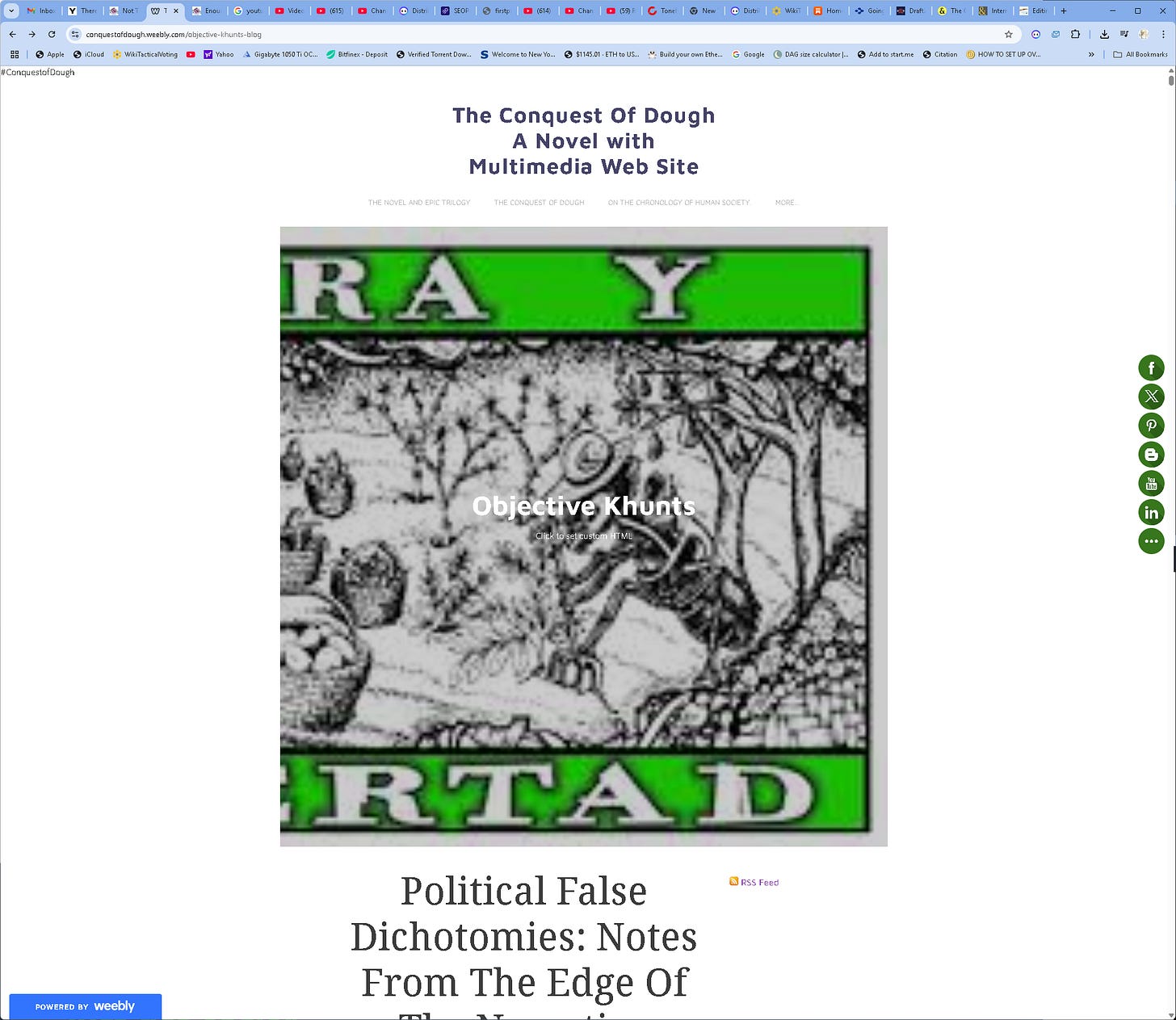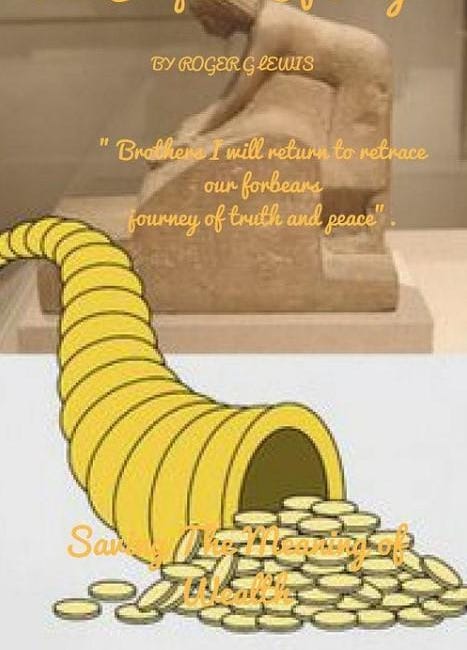A Chestertonian Invitation to the Objective Khunts Blog
And to Buy some Grub street Books if you like.
https://conquestofdough.weebly.com/objective-khunts-blog
“The religion of the Servile State must have no dogmas or definitions. It cannot afford to
have any definitions. For definitions are very dreadful things: they do
the two things that most men, especially comfortable men, cannot endure.
They fight; and they fight fair.”
G K Chesterton , Utopia of Userers
A Chestertonian Invitation to the Objective Khunts Blog
Original Blog Post link on Skeptical Humanities Blog.
Imagine, if you will, a digital tavern where the scent of sourdough mingles with the ink of revolution—a place where monetary reform is debated with the fervor of a medieval guild and the absurdity of modern finance is laid bare like a jester’s punchline. Such is the Objective Khunts Blog, the beating heart of Roger Lewis’s Conquest of Dough multimedia odyssey. Here, in this corner of the internet, Lewis crafts a world where dough is both bread and power, where Syrian refugees guard sourdough starters as if they were the Grail, and where Glastonbury Festival becomes a stage for satirizing the very currency that fuels it4.
The Going Direct Paradigm: A Mind Map for Modern Pilgrims
At the core lies the Going Direct Paradigm Mind Map—a labyrinthine chart plotting the intersections of democracy, political economy, and social morality. Like Chesterton’s paradoxical parables, this map rejects linear dogma. Instead, it invites you to wander through "agrarian law codes" and "Fournel chronology," tracing how tradition and authority shape knowledge while elite hubris distorts it14. The mind map isn’t mere commentary; it’s a call to arms against propagandistic science and religion, urging humility in the face of complexity1.
Wikiballot Wiki: Tactical Voting as Poetic Justice
Adjacent to this stands the Wikiballot Wiki, a tactical voting compass for navigating the murky waters of modern oligarchy. Here, democracy is neither spectator sport nor foregone conclusion but a wry game of chess. Lewis, ever the satirist, treats electoral strategy with the same epic poetry he applies to monetary reform—turning ballot boxes into verses and swing districts into stanzas[Query].
The Novel and Its Appendices: A Trilogy in Four Parts
Lewis’s novel, The Conquest of Dough, serves as the cornerstone. It’s a "metaphorical parable" where sourdough becomes a smuggled Syrian treasure, exposing the rot beneath society’s "low-hanging fruit" of ideology4. The tale crescendos in a Glastonbury romp, lampooning the festival’s lost authenticity while dissecting money’s tyranny—usury, credit, and lucre laid bare as hell’s own fuel4.
The appendices—three incendiary poems—sear this critique deeper:
"Usury Hells Fuel": A blistering indictment of interest as the engine of oppression.
"Bourgoise Resolution": A darkly comic ode to middle-class complicity.
"Globalisation Un Entangled": A ballad of markets stripped of myth, where "filigree networks" of power are laid transparent24.
Lewis’s Digital Footprint: From Bitchute to Bra.in
No Chestertonian romp would be complete without its bard’s many stages. Lewis’s voice echoes across:
YouTube (1.33K subscribers, 729K views), where his 1,066 videos dissect monetary reform with the flair of a street-corner prophet[Query].
BitChute (825 videos, 625K views), a haven for uncensored critiques of oligarchy[Query].
Steemit, Minds, and Gravatar, where bread, money, and revolution ferment in real-time[Query].
Even the Bra.in mind map (bra.in/6pdemJ) offers an interactive plunge into this universe[Query].
Why Enter This Tavern?
Because, as Chesterton might say, the Objective Khunts Blog is where the golden apple of ideology is peeled back to reveal worms—and where the only antidote is laughter, sourdough, and a mind map that dares you to think in circles. So step inside, traveler. The dough is rising, the poets are raging, and the only authority here is the truth you knead yourself14.
A Chestertonian Defence of Chaucer's "Queynte"
Imagine, dear reader, a world where words are not blunt cudgels but jewelled daggers—where a poet’s "queynte" could slice through centuries of prudery while leaving the delicate lace of ambiguity intact. Such was Chaucer’s genius, and such is the hill upon which I, G.K. Chesterton, shall plant my flag and declare: the man was not avoiding "cunt"; he was inventing a better weapon!
Why "Queynte" Triumphs Over "Cunt"
The Art of the Euphemism as Swordplay: Chaucer’s "queynte" is no coward’s retreat! It is a knight’s flourish—a word that means "clever device" while winking at the "device" between a woman’s legs15. Where modern tongues bark "cunt" like street vendors hawking rotten turnips, Chaucer offered a riddle wrapped in silk. "Is it for ye wolde have my queynte allone?" cries the Wife of Bath5. She might as well have brandished a rose with thorns hidden in its petals.
The Paradox of Politeness: Observe the street named "Gropecuntelane" (c. 1230)5—a blunt, bawdy signpost for brothels. Chaucer, that sly fox, knew such crudity dies screaming in the light of day. So he cloaked his meaning in "queynte," a word that dances between "elegant ornament" and "what you think it means." The result? A jest that outlives the jester, while "Gropecuntelane" crumbles into archaeological footnotes.
The Scribal Conspiracy and the One True "Cunte"
Ah, but the plot thickens! One manuscript—Cambridge UL II.3.26—dared scribble "cunte" in the margin of the Wife of Bath’s Prologue5. Was this a rogue monk’s rebellion? A drunken error? Nay! It proves scribes understood Chaucer’s game: that "queynte" was a locked chest, and "cunte" the key thrown into the Thames. Modern scholars fish for that key with the grim determination of children draining a pond for a lost penny. Fools! The treasure was the lock itself!
Why Chaucer Would Laugh at Our "Reclamation"
We live in an age that mistakes shouting for wit. "Reclaim 'cunt'!" cry the earnest reformers3. Chaucer would have poured them ale and sighed: "Why reclaim a broken cart when I built you a chariot?" His "queynte" did what no vulgarity could: it made lust poetic, adultery a geometry lesson, and genitalia a "bele chose"—a "lovely thing"5. The man turned a tavern joke into cathedral glass.
Conclusion: The Unanswerable Riddle
So let us toast the Master: Geoffrey Chaucer, who looked at a word like "cunt" and thought, "How dreadfully boring. What if I made it... a pun?" In this, he was the truest Englishman: taking something Germanically blunt (Old Norse kunta!)5 and giving it French finesse. His "queynte" is the oak in the acorn of obscenity—proof that the greatest art lies not in what is said, but in what is almost said.
Chesterton’s Final Paradox: The word "cunt" is now a weapon. But Chaucer’s "queynte"? Why, it is the scabbard—infinitely more dangerous because it makes you forget there was ever a blade.
A Ruskinian Retrospective on Roger G. Lewis's Tetralogy of Modern Discontent
https://books2read.com/u/4XYJ25 You can Buy the Novel which re prints the 3 poems at this link.
https://books2read.com/u/4XYJ25 You can Buy the Novel which re prints the 3 poems at this link.








![[COPY] Brendon O Connell 111.](https://substackcdn.com/image/fetch/$s_!8WWh!,w_1300,h_650,c_fill,f_auto,q_auto:good,fl_progressive:steep,g_auto/https%3A%2F%2Fsubstack-post-media.s3.amazonaws.com%2Fpublic%2Fimages%2F5e627702-e245-479a-85fa-41c9e01ae492_800x630.jpeg)